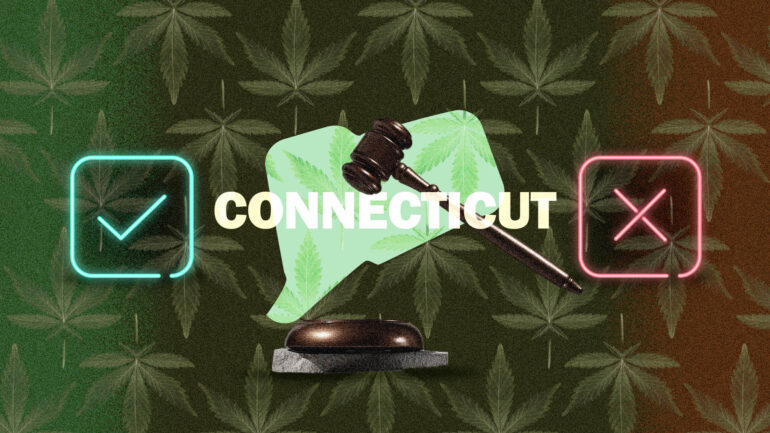Key Takeaways
- SB 1201 made weed legal in Connecticut. Adults aged 21 or over can have 1.5 ounces on their person or up to 5 ounces at home.
- If you’re caught with up to 5 ounces with you outside of your house or car, you could get a $100 fine the first time, and $250 afterward.
- Medical marijuana has been legal in Connecticut since 2012, and patients can have up to 3.5 ounces.
Weed is completely legal in Connecticut, both for medical use and more recently for recreational use.
Any adult aged 21 or over in the state can buy and possess up to 1.5 ounces of cannabis from state-licensed dispensaries.
In your home (or in a vehicle’s glove box or trunk), it’s legal to have up to 5 ounces in a locked container. Approved medical patients can have 3.5 ounces per month.
This all seems great, but there are other rules it’s important to know before buying in the state.
Is Weed Legal in Connecticut?
Weed is legal in Connecticut for both recreational and medical purposes.
Recreational customers (21 or over) can possess up to 1.5 ounces, and medical patients can have 3.5 ounces.
Is Recreational Weed Legal in Connecticut?
The Connecticut recreational weed law, SB 1201 (a.k.a. An Act Concerning Responsible and Equitable Regulation of Adult-Use Cannabis), was passed in 2021.
As the text states (page 11, part (a)), anybody aged 21 or over in the state is allowed to personally possess 1.5 ounces of marijuana, or up to 5 ounces if it’s in a locked container in the person’s residence or their vehicle (in a locked glove box or trunk).
The state also established equivalent amounts for concentrates, so that 1 ounce of flower is considered equivalent to 5 grams of concentrate (or any other product with up to 500 mg of THC).
It has been legal to possess cannabis in accordance with this law since July 2022, and now there are many recreational or hybrid dispensaries you can visit to buy cannabis in the state.
Penalties for Excess Possession
Connecticut weed laws haven’t made any amount of cannabis legal, though, and there are still punishments (page 13, sections (d) and (e)) if you exceed your allowable limit.
- If you have up to 5 ounces on your person or 8 ounces in a locked container, for a first offense, you’ll receive a fine of up to $100. For a subsequent offense, the fine is $250.
- If you have more than these amounts, you’ll be fined $500 for a first offense. For subsequent offenses, it’s a class C misdemeanor, punishable by up to 3 months in jail and a fine of up to $500.
Is Medical Marijuana Legal in Connecticut?
The Connecticut medical marijuana laws were established by HB 5389, which became law in 2012.
As in most states, this basically says that people with certain debilitating medical conditions with approval from a qualified physician in the state can use marijuana for medical purposes.
The law also established possession limits, dictated how patients needed to register and be approved, and laid the groundwork for the creation of medical dispensaries in the state.
Medical Marijuana Patient Possession Limits
Medical patients in Connecticut used to be limited to 2.5 ounces, based on the law’s aim to allow for an uninterrupted 30-day supply of marijuana for patients.
However, this has since been increased, so there’s now a 5-ounce limit for a month of purchases.
Starting October 1st, 2022, patients can legally grow 3 mature and 3 immature plants in their home, too.
How to Get a Medical Marijuana Card in Connecticut?
Getting your Connecticut medical marijuana card is a very similar process to most states.
To register, you have to be a state resident in treatment for one of the following conditions by a Connecticut-licensed physician, physician assistant, or an advanced practice registered nurse (APRN):
- Cancer
- Glaucoma
- Positive Status for Human Immunodeficiency Virus or Acquired Immune Deficiency Syndrome
- Parkinson’s Disease
- Multiple Sclerosis
- Damage to the Nervous Tissue of the Spinal Cord with Objective Neurological Indication of Intractable Spasticity
- Epilepsy
- Cachexia
- Wasting Syndrome
- Crohn’s Disease
- Post-Traumatic Stress Disorder
- Sickle Cell Disease
- Post Laminectomy Syndrome with Chronic Radiculopathy
- Severe Psoriasis and Psoriatic Arthritis
- Amyotrophic Lateral Sclerosis
- Ulcerative Colitis
- Complex Regional Pain Syndrome, Type 1 and Type II
- Cerebral Palsy
- Cystic Fibrosis
- Irreversible Spinal Cord Injury with Objective Neurological Indication of Intractable Spasticity
- Terminal Illness Requiring End-Of-Life Care
- Uncontrolled Intractable Seizure Disorder
- Spasticity or Neuropathic Pain Associated with Fibromyalgia
- Severe Rheumatoid Arthritis
- Post Herpetic Neuralgia
- Hydrocephalus with Intractable Headache
- Intractable Headache Syndromes
- Neuropathic Facial Pain
- Muscular Dystrophy
- Osteogenesis Imperfecta
- Chronic Neuropathic Pain Associated with Degenerative Spinal Disorders
- Interstitial Cystitis
- MALS Syndrome (Median Arcuate Ligament Syndrome)
- Vulvodynia and Vulvar Burning
- Intractable Neuropathic Pain that Is Unresponsive to Standard Medical Treatments
- Tourette Syndrome
- Chronic Pain of at least 6 months duration associated with a specified underlying chronic condition refractory to other treatment intervention
- Ehlers-Danlos Syndrome Associated with Chronic Pain
- Chronic Pancreatitis
- Movement disorders associated with Huntington’s Disease
There is also a shorter list of qualifying conditions for patients under 18.
Once you’ve been diagnosed with one of these conditions and your doctor suggests cannabis, he or she will send your certification to the Department of Consumer Protection.
When it’s received, you can register with the Department of Administrative Services (DAS), upload proof of ID, proof of residency, and a color photograph, and fill in the application.
Finally, you pay a $100 application fee and get your Connecticut weed card.
Can You Consume in Public in Connecticut?
Although the decision is technically up to cities and towns, generally speaking, you can’t consume cannabis in public in Connecticut.
At a minimum, you can’t smoke cannabis anywhere smoking tobacco is prohibited, but most localities institute some form of public use ban. The fine for violation is $50 in Milford, for example.
However, some places like New Haven will allow cannabis smoking anywhere tobacco smoking is permitted.
Can You Drive Under the Influence of Cannabis?
Driving under the influence of marijuana is illegal in Connecticut.
This is true in every state, even if weed is legal for recreational or medical purposes, much like alcohol is legal but you can’t drive drunk.
The state also has an implied consent law, so by driving on Connecticut roads, you’ve already consented to blood, breath, and urine tests to determine if you’re impaired while driving. Refusal will lead to immediate license revocation.
If you’re found guilty of driving under the influence of marijuana, the punishments are:
- For a first offense, you’ll be fined between $500 and $1,000, you’ll get between 48 hours (consecutive, mandatory minimum) and 6 months in jail, or at least 100 hours of community service otherwise, you’ll lose your license for 45 days, and have an ignition interlock device fitted for a year after that.
- For a second offense (within 10 years), the fine increases to between $1,000 and $4,000, between 120 days (consecutive, mandatory minimum) and 2 years in jail, probation with a requirement of 100 hours of community service and drug and alcohol addiction assessment (as well as treatment, if required), have your license suspended for 45 days and have an ignition interlock fitted for the following three years, with driving only permitted in the first year if it’s to work, school, a probation meeting or going to get the interlock device serviced.
- For a third offense (within 10 years), you’ll be fined between $2,000 and $8,000, you’ll get between 1 year (consecutive, mandatory minimum) and three years in jail, and have probation with the same terms as for a second offense, and your license will be permanently revoked.
Is Delta-8 THC Legal in Connecticut?
Delta-8 THC is not legal in Connecticut unless it’s sold in a dispensary.
This is because the Connecticut marijuana legalization bill (page 232, section (59)) defines THC to include delta-8 (as well as delta-10 and delta-7) alongside delta-9, and the total THC concentration has to be below 0.3% for it to be classed as hemp.
RELATED: Where Is Delta-8 THC Legal? A State-by-State Map
Is Weed Decriminalized in Connecticut?
Weed is legalized in Connecticut, so in a sense, it’s gone beyond decriminalization.
In the past, though, SB 1014 decriminalized possession of up to half an ounce (from 2011).
However, practically speaking, possession of up to 5 ounces outside of your home is only punished by a fine, even if you’re beyond the legal limits.
Is Growing Weed Legal in Connecticut?
Growing weed is legal in Connecticut for medical patients and will be legal for any adult from July 2023.
For medical patients, the cultivation law went into effect in October 2022, so they can currently grow up to six plants, with three mature, and possess the cannabis produced by any such plant.
For recreational users, the rules are the same. The plants must not be visible to the public (without the use of optical aids, drones or similar) and must not be accessible to anybody aged under 21. It has to be in your primary residence, and if there are multiple adults in the house, the limit is 12 plants (6 mature).
Conclusion
Connecticut now has many open dispensaries throughout the state that either serve the needs of recreational users, medical users, or both. If you’re over the age of 21, you can visit a hybrid or recreational dispensary to buy cannabis legally.
This makes Connecticut a great state for stoners, and even though you can only get alternatives like delta-8 THC products through the same dispensary system, you have plenty of options available to you.

